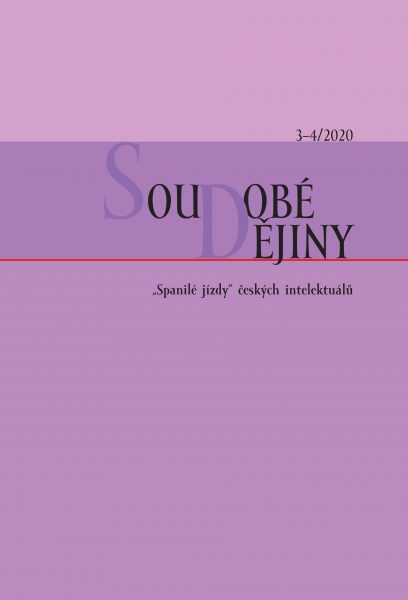"Křičel jsem: – Mrdat, mrdat!"
"I was shouting – fuck, fuck!"
Vítězslav Nezval and his poetics of Moscow
Author(s): Tomáš GlancSubject(s): Language and Literature Studies, Cultural history, Czech Literature, Russian Literature, Interwar Period (1920 - 1939), History of Communism
Published by: AV ČR - Akademie věd České republiky - Ústav pro soudobé dějiny
Keywords: Vítězslav Nezval;Moscow;Soviet Union;Czech literature;avant-garde;surrealism;eroticism
Summary/Abstract: In August 1934, poet and writer Vítězslav Nezval (1900–1958), a leading personality of the Czechoslovak inter-war art avant-garde and also a member of the Communist party, visited Moscow as one of the Western guests invited to the founding congress of the Union of Soviet Writers; one year later, he published a prosaic-essayistic reflection of his visit under the title "The Invisible Moscow" (Neviditelná Moskva. Praha: F. Borový, 1935). The purpose of the present study approached from a semiotic angle is to obtain access to the intentional meaning of this specific testimony concealed behind a factual description of events and environments. The author first outlines a broader socio-political context consisting in an intensive interest of Western left-wing intellectuals in the Soviet Union between the world wars and, on the other hand, in systematic efforts of the Soviet leadership to make use of this potential for their own benefit. Nezval ranked among artists who felt a priori sympathies toward the Soviet social experiment, and they are clearly seen in his text, although he himself declared that his intention was not to provide a testimony about the Soviet “objective reality” which is what media reports or articles do. To understand Nezval’s work, the author believes it must be kept in mind that Nezval, while in the Soviet Union, was looking for, first and foremost, inspiration and connections with poetic and ideological principles he professed. Nezval’s cognitive method is intuition, free of any rational and critical reflections, and his creative principle is imagination, whose incarnation Nezval founds in surrealism. The reality around him serves as a matter for a distillation of experiences occurring in a dream mode. This allows him to overlook or willfully interpret various phenomena related, for example, to the repressive aspect of Stalin’s regime or the onerous everydayness of the Soviet Union’s citizens. The author sees the dominant feature of this dreamlike experience and the line connecting seemingly incompatible segments of reality into all-embracing lyrical intoxication in an erotic principle. Nezval is excited by Moscow as an object of bliss, as a source of sexual arousal. This principle is offered to him as a key enabling an individual to cross the boundary of individualism and blend into the society as a bridge between the eternity of sexual ecstasy and the eternity of the classless Communist society, thus promising the fulfillment of human utopias. The author provides an analysis of the text of "The Invisible Moscow" in support of his conclusions, and links them to some period esthetic and philosophical concepts.
Journal: Soudobé Dějiny
- Issue Year: XXVII/2020
- Issue No: 3+4
- Page Range: 576-590
- Page Count: 15
- Language: Czech

